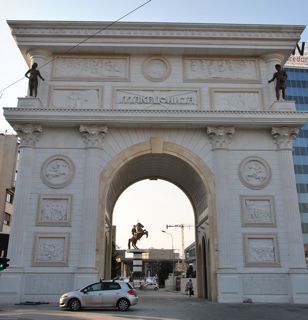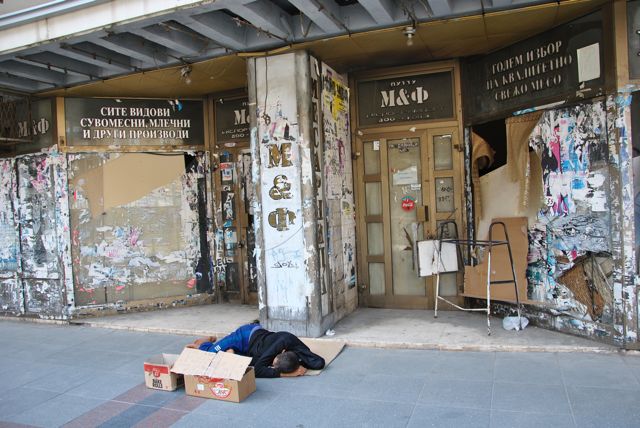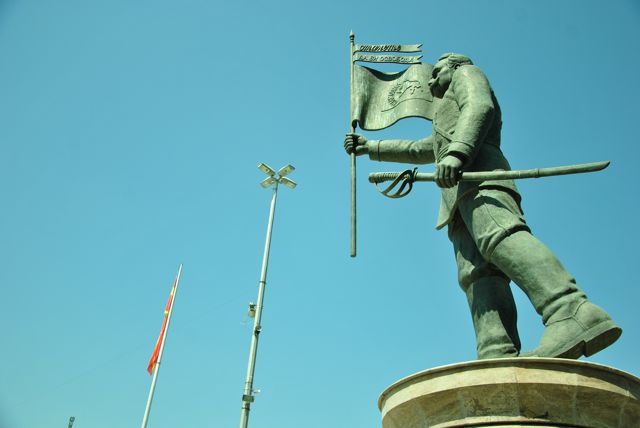Photos: Polina Spartyanova
Polina Spartyanova
Yianna was walking with me to the central square in Skopje. She was born and raised in the capital of Macedonia, but it seemed the city centre was as unfamiliar to her as it was to me. As a hospitable host, Yianna wanted to introduce me to all that was unknown and interesting to me in this part of the city, but I could tell she did not feel like going to the city centre, known as "Skopje 2014". "Since the construction works in the centre of Skopje have started I avoid coming here because I feel sorry for the old city centre and feel stupid amidst all these monuments that no one knows what they glorify," Yianna told me with a shade of annoyance in her voice. Like many young Macedonians, she will seek options for her future development abroad because she sees no opportunity to develop in her home country.
 Against the background of the project "Skopje 2014", Yianna’s problems started to look minute because the megalomania of the new city centre began to "pour on" us from all sides. We entered through the "Macedonia" triumphal arch which depicts all moments of Macedonian history that were the ground for the "triumph" of the country, including the writing of the Slavic alphabet by the brothers Cyril and Methodius and its dissemination by Clement of Ohrid. Immediately at the triumphant entrance of Skopje centre, one can see the most popular (according to Tripadvisor) and the largest monument of the project, namely that of the nameless rider. Even upon presenting the project for the monument a few years ago it was planned as a monument of Alexander the Great, but this caused another problem in the Greek-Macedonian talks on the name to the young 23-year-old state.
Against the background of the project "Skopje 2014", Yianna’s problems started to look minute because the megalomania of the new city centre began to "pour on" us from all sides. We entered through the "Macedonia" triumphal arch which depicts all moments of Macedonian history that were the ground for the "triumph" of the country, including the writing of the Slavic alphabet by the brothers Cyril and Methodius and its dissemination by Clement of Ohrid. Immediately at the triumphant entrance of Skopje centre, one can see the most popular (according to Tripadvisor) and the largest monument of the project, namely that of the nameless rider. Even upon presenting the project for the monument a few years ago it was planned as a monument of Alexander the Great, but this caused another problem in the Greek-Macedonian talks on the name to the young 23-year-old state.
 The statue of the nameless rider is 22 metres high, 30 tons in weight and it is built on a 10-metre concrete pedestal on which relief scenes of the battles of Alexander of Great are mounted as well. Moreover, to make the kitsch complete, a fountain is installed at the foot of the monument that sprays water in many different ways, and at night, a music water programme accompanies the show. The 10 million euro invested in that monument not only do not attach the desired greatness to the unknown rider, but he looks like he is advertising a casino or nightclub. Perhaps no one knows the name of the great warrior because he himself feels ashamed to admit it to the public.
The statue of the nameless rider is 22 metres high, 30 tons in weight and it is built on a 10-metre concrete pedestal on which relief scenes of the battles of Alexander of Great are mounted as well. Moreover, to make the kitsch complete, a fountain is installed at the foot of the monument that sprays water in many different ways, and at night, a music water programme accompanies the show. The 10 million euro invested in that monument not only do not attach the desired greatness to the unknown rider, but he looks like he is advertising a casino or nightclub. Perhaps no one knows the name of the great warrior because he himself feels ashamed to admit it to the public.
Over the past few years, "Skopje 2014" has caused a sensation for probably being the biggest construction site in Europe compared with other capitals in it. According to the official data of the VMRO-DPMNE government that is financing the project, its cost amounts to about 208 million euro, but according to the opposition, the amount spent is nearly half a billion euro. The result is there, as over the course of three years, the national-conservative government of Prime Minister Nikola Gruevski has been able to erect, against this amount, 40 monuments and 20 monumental buildings in the centre of Skopje, and the construction works are continuing even today, although they were supposed to have been completed before the new year 2014. The aim of the expensive and megalomaniac project is to show that Macedonians are a proud European nation with their own civilization and cultural heritage, but at the same time, it is a very good cover for the great number of financial frauds of the government of Nikola Gruevski, who has been in power from 2006 to the present day.

Although the President of VMRO-DPMNE promised at the beginning of his rule eight years ago Euro-Atlantic integration and improved foreign relations with neighbouring countries, today it is impossible to think in that direction. Greece’s blockade policy against FYROM due to the dispute over the name "Macedonia" helped Gruevski stabilize and "anchor" his regime in the small country of two million inhabitants. Most likely, he does not seek reconciliation with its southern neighbour, because that would have moved Macedonia towards reforms to open negotiations on its accession to the European Union, which he does not want to address. President of Bulgaria Rosen Plevneliev has also contributed towards stimulating the populist policy of Gruevski by expressing Bulgaria's stance that the two countries need an agreement for good neighbour relations before starting their co-existence within the Union.

During the eight years of his rule, Prime Minister of Macedonia Nikola Gruevski has been gradually building his authoritarian semi-democracy upon the ailing Macedonian self-consciousness, controlling key judicial and administrative institutions and much of the media sector in the country. The culmination of his policy of populism and ethnocentrism is the project "Skopje 2014" at which the 30-ton copper nameless rider is looking. "Project "Skopje 2014" raised the head of Macedonians in Macedonia and showed many things associated with the identity of this nation and people," Gruevski expressed his opinion of the matter.